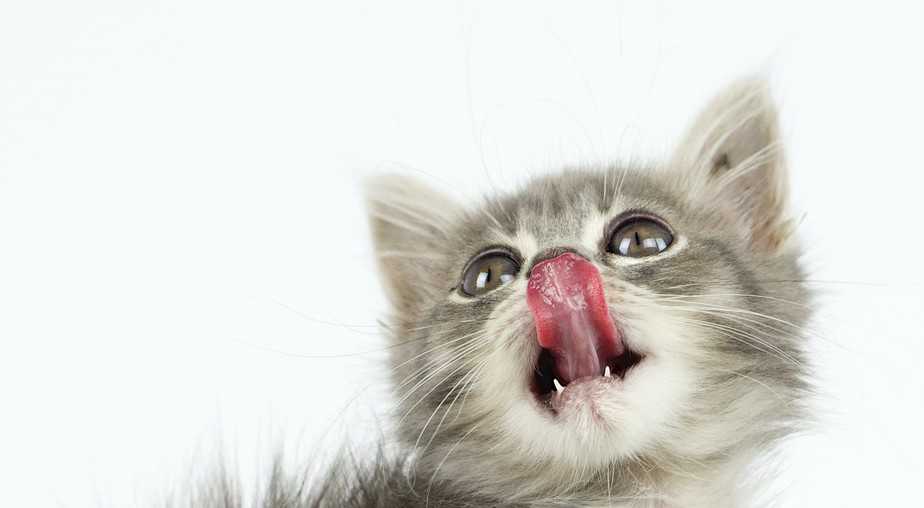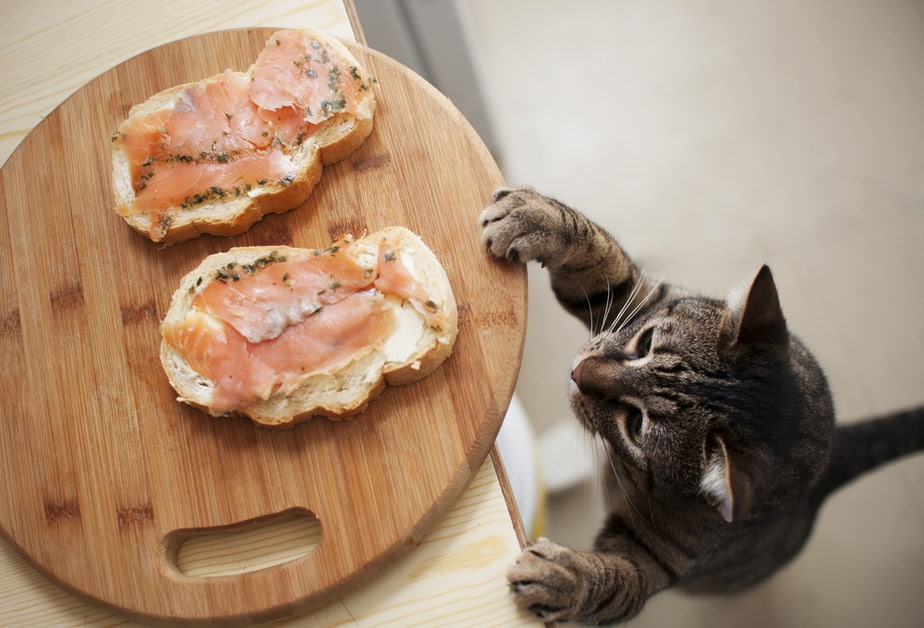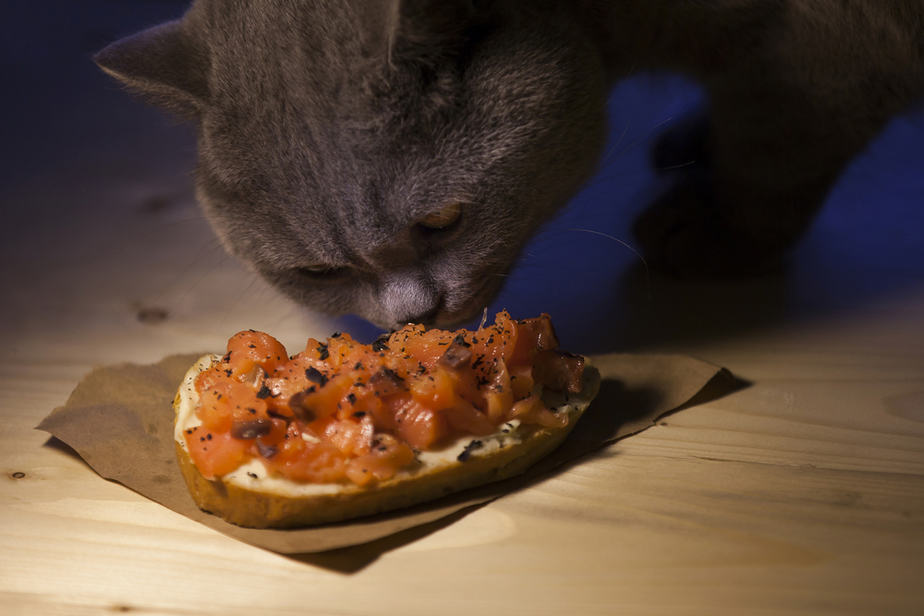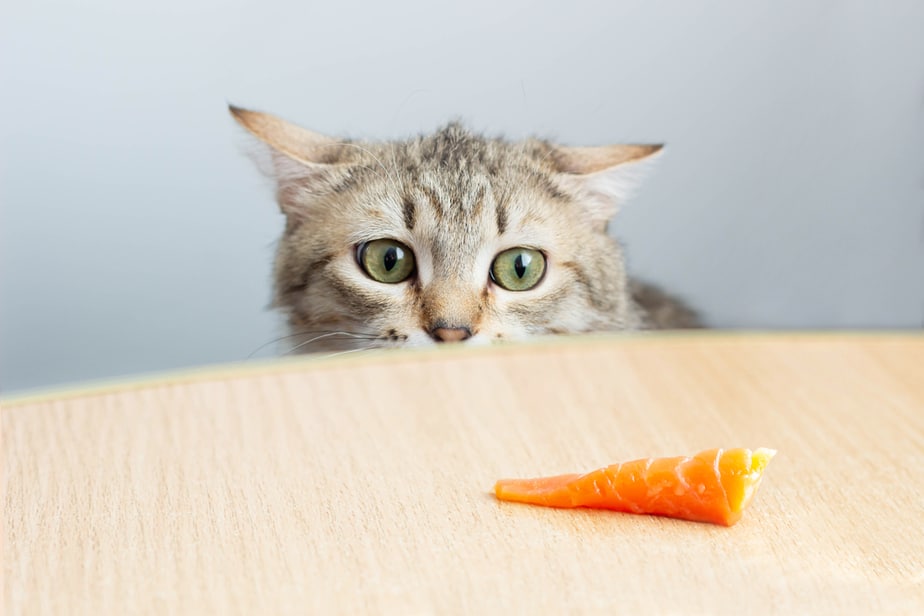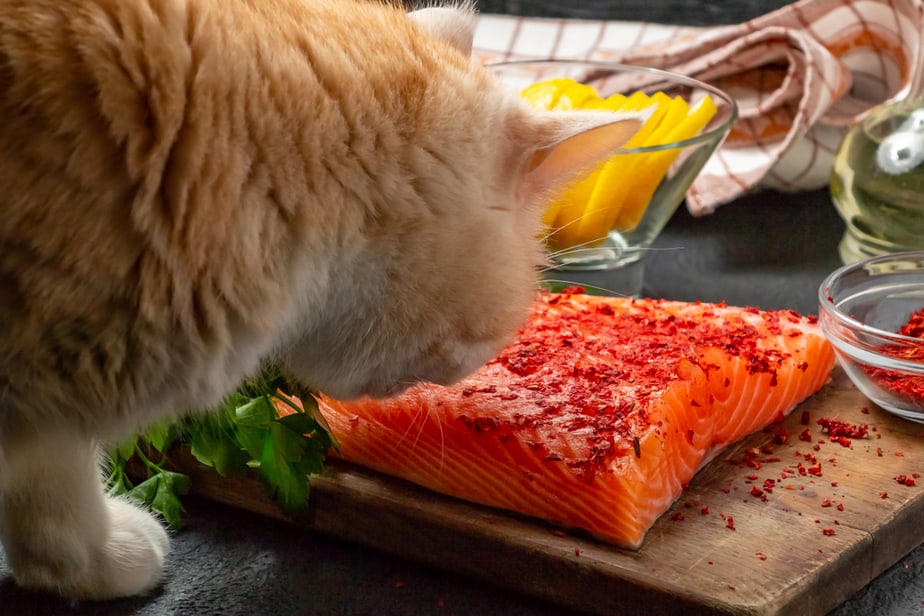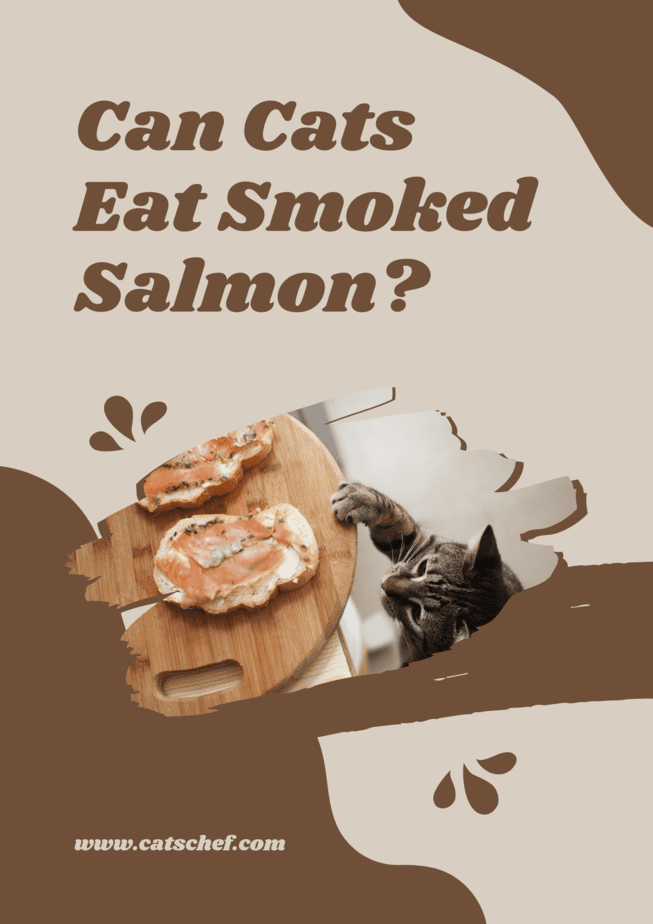📖 Table of Content:
Salmon is universally loved all over the world. It’s one of those delicacies everybody wants on their dinner plate – including your cat. Cats are known seafood connoisseurs so you never really wondered if you needed to make any changes to your charcuterie board. Can cats eat smoked salmon?
Let’s be honest – your ravenous rascal jumps at the very mention of smoked meats. Their mouth-watering taste, distinctive scent, and chewy texture seem like heaven to your cat. It’s no surprise she’s always asking for more even though you know she shouldn’t eat too much.
Smoked meats aren’t a recommended source of protein for cats. They do still contain some amazing benefits, but processed meats tend to be packed with sodium, preservatives, and sweeteners which make them unsuitable for your cat.
Smoked salmon is no exception. Cats can eat smaller amounts of smoked salmon without any repercussions, but you should avoid adding it to your cat’s regular diet. Fresh salmon might be a better choice for your feline friend.
Can cats eat smoked salmon? Detailed explanation
Cats are obligate carnivores, which means they require animal protein to survive. Salmon is a great source of protein which makes it an excellent option for your furry friend. In addition, salmon is packed with cat-friendly vitamins and minerals like niacin, potassium, vitamins B6 and B12.
It is also rich in Omega-3 and Omega-6 fatty acids which have anti-inflammatory properties. Basically, they shield your cat from inflammatory diseases like arthritis, kidney disease, heart disease, and numerous bowel issues. But, what about smoked salmon?
Smoked salmon is an expensive delicacy popular among humans. It’s usually made from a salmon fillet that has been cured and smoked. During the curing stage, salmon is kippered with salt, sugar, and spices. After that, it’s left to smoke and dry to a jerky-like texture.
Red flag alert – cats are really sensitive to both salt and sugar. Smoked salmon might not be the best choice for your cat because it might lead to various digestive issues. A bite of smoked salmon won’t cause any serious damage, but it’s better to be safe than sorry.
Reasons why you shouldn’t feed your cat smoked salmon
If you’re really set on sharing some smoked salmon with your cat, you can always consult with your vet. Smaller amounts of smoked salmon won’t do any harm to your precious pet and they might keep her curiosity satisfied for a while.
Feeding your cat smoked salmon regularly is a really bad idea. Smoked salmon contains high levels of sodium and fat, and the smoking process destroys some of those vitamins, minerals, and amino acids. You basically get all the risks with very few benefits.
So, let’s dive in.
1. Smoked salmon contains high sodium levels
Picture this – your cat should only consume about 41 milligrams of salt a day. A modest portion of smoked salmon contains about 800 milligrams of salt. You might think you can get your cat to stop eating after one bite, but we all know she has her ways of getting exactly what she wants.
Sodium poisoning is a serious issue in the feline world. Let’s be honest, 800 milligrams of salt is too much for your cat’s kidneys to handle. If your cat sneakily eats an entire pack of smoked salmon make sure to keep an eye out for common symptoms of sodium poisoning.
She might experience decreased appetite, lethargy, excessive thirst and urination, vomiting, and diarrhea. If you notice any of these, contact your vet immediately. You can try giving her water more frequently than usual or even ask your vet to induce vomiting.
If you’re worried your cat’s symptoms are too severe, you can always go to the nearest emergency animal care. Make sure to disclose everything she ate prior to the incident (as well as the amount of smoked salmon she managed to eat before you caught her).
Also, try to be more careful in the future!
2. Smoked salmon contains high fat levels
It’s important to mention that smoked salmon contains unsaturated fats which have many health benefits in the feline world. They can improve blood cholesterol levels, reduce inflammation, and shield against various inflammatory diseases.
Smoked salmon also contains saturated fats, but such a small amount is pretty insignificant in the grand scheme of things. You shouldn’t be worried about that when choosing to introduce smoked salmon to your cat’s diet.
The main risk of a high-fat diet is feline obesity. Smoked salmon is calorically dense, and it isn’t an appropriate choice for a chubby kitty. Feline obesity can lead to various other health issues so you should be careful with the amount of smoked salmon you choose to give to your cat.
Overweight cats are at greater risk of developing illnesses like diabetes, liver disease, arthritis, pancreatitis, and various gastrointestinal diseases. Early symptoms include weakness, lethargy, and decreased quality of life. Take that into consideration next time you share some smoked salmon with your cat!
3. Smoked salmon contains lower levels of taurine
Taurine is an essential amino acid in the feline world. Cats need large amounts of taurine to function properly. Cats can make smaller amounts of this amazing amino acid on their own, but they usually have to get it from other sources.
Taurine is incredibly important for maintaining the proper function of your cat’s immune system, digestive tract, pregnancy, and fetal development. Salmon is a great source of taurine for cats, but smoked salmon isn’t. How come?
The smoking process destroys any remnants of taurine in salmon. If you’re worried about taurine deficiency (which you should be), it might be a better idea to find other healthy treats rich in essential amino acids.
4. Smoked salmon can contain histamines, toxins, and heavy metals
The risk of infecting your cat with histamines, toxins, and heavy metals is also present in fresh salmon. Unfortunately, the process of curing and smoking the salmon doesn’t remove any of these threats. So, let’s start from the beginning.
Histamines are compunds that protect your body from inflammation. That doesn’t sound so bad, does it? But, excessive amounts of histamines might lead to allergic reactions in cats.
Smoked salmon can contain a dangerous amount of these compounds, depending on where it was sourced from. Farmed salmon should have lower histamine levels than wild salmon.
Either way, freshly caught and immediately frozen fish should be safe. But you can never know with smoked salmon!
Toxins and heavy metals might be present in smoked salmon because of the overall water pollution. Wild salmon spends most of its life in polluted waters ingesting all those parasites, toxins, and bacteria. Not only that, but salmon can also contain high levels of heavy metals like mercury.
Farmed salmon is less likely to contain toxins as it spends most of its life in clean water. It’s also less likely to contain mercury or any other heavy metals. Smoked salmon is pre-packaged and the label usually doesn’t disclose whether it was made from wild or farmed fish.
Either way, smoked salmon seems to be more trouble than it’s worth. Before feeding your cat any smoked meats make sure to consult with your vet. A couple of bites won’t do your feline friend any harm, but you should avoid adding it to her regular diet.
Are there any reasons why cats should eat smoked salmon?
If your cat’s curious eyes light up when she sees you put some smoked salmon on your plate, you shouldn’t resist her pleas. An occasional treat won’t cause her any harm, and it will keep her hungry little heart satisfied.
Smoked salmon isn’t toxic to cats. Not only that, it contains similar nutritional benefits to fresh salmon. It’s true that some of those vitamins, minerals, and amino acids are lost during the process of smoking, but it can still be considered a healthy treat.
If your cat’s regular diet is healthy and rich in animal protein, vitamins, and minerals – you have nothing to worry about. Consult with your vet before making any changes, and make sure your precious pet isn’t allergic to seafood.
So, can cats eat smoked salmon?
The final verdict is here – cats can eat tiny amount of smoked salmon but that doesn’t mean they should. Smoked salmon isn’t toxic to cats and small amounts won’t cause any adverse reactions.
However, smoked salmon does contain high sodium and fat levels. That means that you should control the portion you give to your cat and keep an eye out for any sodium poisoning symptoms. If you have a chubby kitty, you might want to tell her to sit this one out as smoked salmon is packed with calories.
Smoked salmon does lack taurine, so you want to make sure to provide your cat with a variety of fresh meats. If you’re worried about mercury and other heavy metals, you can try to find farmed salmon and smoke it yourself. Homemade is always better!
It’s no secret cats love salmon. There might be better alternatives on the market, but if your feline friend is obsessed with smoked salmon as much as you are – give her a tiny bite. Life is too short to avoid such lip-smacking delicacies!
Read more: Can Cats Eat Lobster? Delicious Or Dangerous?
